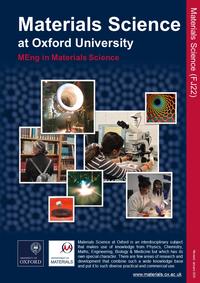The Department of Materials at Oxford
The objectives of the Department of Materials at Oxford University are to produce world class graduate materials scientists and engineers, and to conduct world class research into the manufacture, structure, properties and applications of materials, for the benefit of the UK and world community.
The Department of Materials at Oxford is regularly graded as one of the best materials departments in the UK:
The Complete University Guide - University Rankings & League Tables 2025 (published in 2024) and The Guardian university subject league tables for 2023 and 2024 provide recent data on undergraduate courses in the UK.
In the UK Government's most recent assessment of research excellence in UK universities, the 2021 REF, research from Oxford's Department of Materials and its Department of Engineering Science was jointly submitted to REF Unit of Assessment (UOA) 12 - Engineering^. For this submission 71% of the research activity of the two departments was judged to be in the highest, Grade 4* ('World-leading'), category of excellence and a further 26% as Grade 3* ('Internationally Excellent'). 90% of research impact was judged to be 'World-leading'. [^There is not a specific REF UOA for Materials.]
Oxford's M.Eng undergraduate degree in Materials Science
Read about Oxford's undergraduate degree in Materials Science, a four-year 'Integrated Masters' M.Eng programme, in our Course Brochure and in the Materials Science entry within the on-line University of Oxford Undergraduate Prospectus .
Printed copies of the brochure 'Materials Science at Oxford University' can be obtained from undergraduate.admissions@materials.ox.ac.uk
What is Materials Science?
Materials Science is an interdisciplinary subject, spanning the physics and chemistry of matter, engineering applications and industrial manufacturing processes. Modern society is heavily dependent on advanced materials, for example, lightweight composites for more efficient vehicles, optical fibres for telecommunications and silicon microchips for the continuing revolution in digital technology. Materials scientists study the relationships between the structure and properties of a material and how it is made. They also develop new materials and devise advanced processes for manufacturing them. Materials Science is vital for developments in nanotechnology, quantum computing, energy storage and nuclear energy, as well as medical technologies such as bone replacement materials and drug delivery.
To find out more about Materials Science please explore further our Schools Outreach webpages and visit the rest of the Department of Materials website.
If you want to know more about Materials Science at Oxford why not join one of our Open Days and/or have a look at the videos and other content available via our Virtual Outreach webpage.
Here are photographs of our new intakes of Materials undergraduates at Induction in 2019 and in 2022:
Finally have a look at the reports on recent Oxford Materials Industrial Tours to exciting destinations worldwide. Please note that we do not guarantee that industrial tours will be offered.
Astrophoria Foundation Year
Materials Science is a participating subject in the Astrophoria Foundation Year.
The University of Oxford’s Astrophoria Foundation Year is a one-year programme for UK state school students with significant academic potential who have experienced severe personal disadvantage or disrupted education which has resulted in them being unable to meet the academic entry requirements for an Oxford undergraduate degree programme.
The programme is fully funded. Tuition and accommodation fees are covered by the University and students receive a non-repayable bursary for their living costs.
Motivated students will be able to reach their academic potential through this supportive and challenging academic course aimed at developing their skills, self-belief and academic confidence. Students who pass their foundation year course at the required level can progress onto undergraduate study at Oxford without the need to reapply.
You can find out more on the Astrophoria Foundation Year website .
For details about the Materials Science with a Foundation Year Programme please visit our Foundation Year course pages .
An Outline of the Programme Content, Assessment and Key Progression Criteria for the M.Eng in Materials Science
(This outline is for illustrative purposes and details may change from time to time.)
THE OXFORD M.ENG DEGREE PROGRAMME IN MATERIALS SCIENCE FOR ENTRANTS UP TO AND INCLUDING OCTOBER 2024 IS ACCREDITED BY THE INSTITUTE OF MATERIALS, MINERALS AND MINING (IOM3), ON BEHALF OF THE UK ENGINEERING COUNCIL, TOWARDS THE ACHIEVEMENT OF CHARTERED ENGINEER STATUS. NORMALLY THIS PROFESSIONAL ACCREDITATION IS REVIEWED ON A FIVE-YEARLY CYCLE AND THE NEXT REVIEW IS EXPECTED TO TAKE PLACE IN MARCH 2025. FOLLOWING THE OUTCOME OF THE REVIEW WE WILL UPDATE THE PRESENT INFORMATION.






